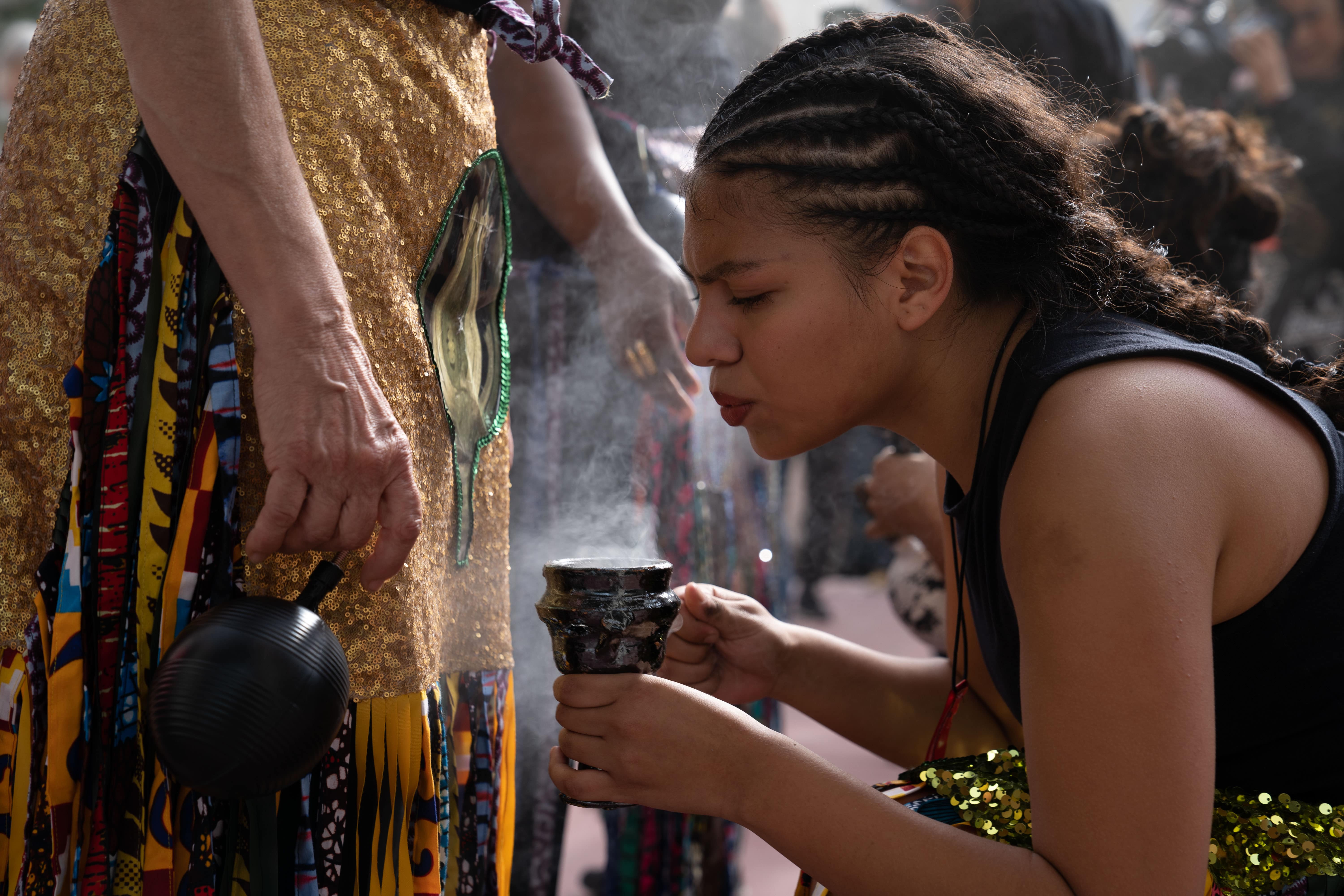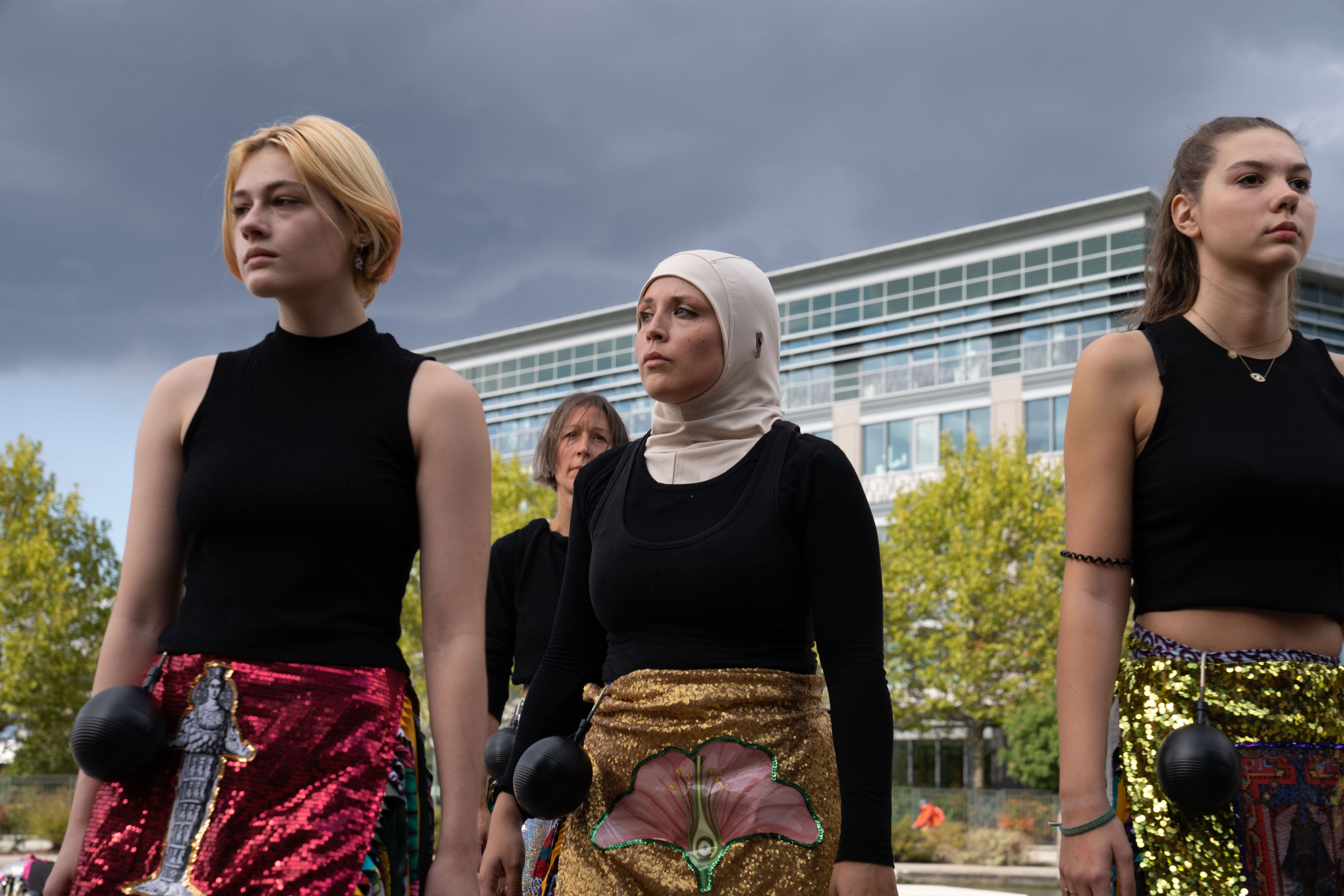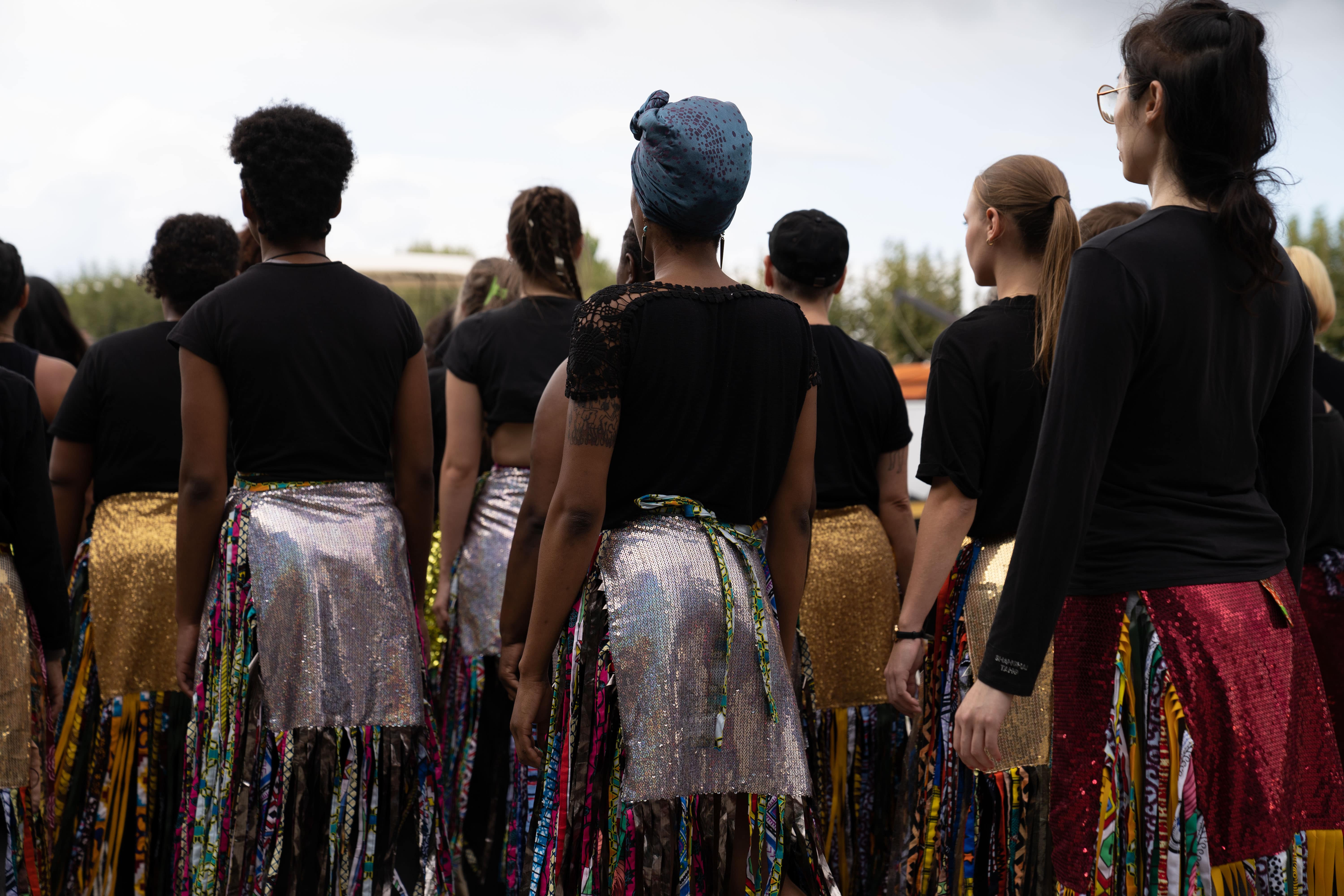


Amanda Piña, Frontera / Procession - A Ritual of Water, 2021. Performance at CND Paris as part of Festival d’Automne à Paris, 2022. Courtesy of Festival d’Automne à Paris. Photos by ©Nathalie Joyeux.
Frontera/ Processión - Un Ritual de Agua (Border / Procession - A Ritual of Water)
"Frontera/Procesión - Un Ritual de Agua” (Border/Procession – A Ritual of Water) by Amanda Piña delves deeply into a choreographic exploration rooted in a dance from the El Ejido Veinte neighborhood in Matamoros, Tamaulipas. Situated on the border between Mexico and the United States, this dance has developed against a backdrop marked by violence from drug trafficking, militarization, and the presence of low-wage industries.
Historically, this dance is connected to the “Danzas de Conquista” (Conquest Dances). Originally devised by the Spanish monarchy, these dances depicted the Christian triumph over the Moors in the Iberian Peninsula. During colonization, they were utilized as a racist propaganda tool to differentiate between white and non-white individuals and were subsequently introduced to Latin America. Indigenous communities were forced to represent the "Moors" and dramatize their defeat, while the Christian role symbolized Spain's triumph. Over time, this dance evolved into a form of resistance or a "re-conquest" against modern/colonial influences and subsequent neoliberal pressures.
In "Frontera/Procesión - Un Ritual de Agua” (Border/Procession – A Ritual of Water), Amanda Piña collaborates with several local civic associations. Their shared goal is to bolster solidarity among women, regardless of their age, origin, or vulnerabilities. Amanda's choreography delves into the intricacies of border dynamics, masterfully integrating elements of hip-hop, colonial narratives, indigenous traditions, and mysticism. She underscores that borders are not merely geographical markers; they're ingrained within our very essence. Through this invigorating water ritual, Amanda seeks to establish a feminist paradigm, striving to nurture and mend for the future. By acknowledging the water flowing through our bodies and surroundings, she lays the groundwork for new solidarities that go beyond the limitations of cultural, national, and aesthetic boundaries.
Historically, this dance is connected to the “Danzas de Conquista” (Conquest Dances). Originally devised by the Spanish monarchy, these dances depicted the Christian triumph over the Moors in the Iberian Peninsula. During colonization, they were utilized as a racist propaganda tool to differentiate between white and non-white individuals and were subsequently introduced to Latin America. Indigenous communities were forced to represent the "Moors" and dramatize their defeat, while the Christian role symbolized Spain's triumph. Over time, this dance evolved into a form of resistance or a "re-conquest" against modern/colonial influences and subsequent neoliberal pressures.
In "Frontera/Procesión - Un Ritual de Agua” (Border/Procession – A Ritual of Water), Amanda Piña collaborates with several local civic associations. Their shared goal is to bolster solidarity among women, regardless of their age, origin, or vulnerabilities. Amanda's choreography delves into the intricacies of border dynamics, masterfully integrating elements of hip-hop, colonial narratives, indigenous traditions, and mysticism. She underscores that borders are not merely geographical markers; they're ingrained within our very essence. Through this invigorating water ritual, Amanda seeks to establish a feminist paradigm, striving to nurture and mend for the future. By acknowledging the water flowing through our bodies and surroundings, she lays the groundwork for new solidarities that go beyond the limitations of cultural, national, and aesthetic boundaries.
CREDITS
Artistic Direction and choreography
Amanda Piña
Artistic Design
Michel Jimenez
Choreography and transmission
Rodrigo de la Torre Coronado, Leader of the Danza de Matamoros
Transmission
Daphna Horenczyck, Juan Carlos Palma Velasco, Lina Venegas, Matteo Marziano Graziano
Performance
Matteo Marziano Graziano, Daphna Horenczyk, Jorge Luis Cruz Carrera, Juan Carlos Palma Velasco, Lina Venegas, Rodrigo de la Torre Coronado and a group of women members of diverse women associations in city where the performance is presented.
Dramaturgy and development
Nicole Haitzinger
Research and theory
Nicole Haitzinger and Amanda Piña
Music
Christian Müller
Live percussion
Juan Luiz Cruz Carrera
Costumes
La mata del veinte/Julia Trybula
Production
nadaproductions
Distribution
Something Great
Senior advisor
Marie-Christine Barrata Dragono
Administration
Angela Vadori / Smart
Funded by
City of Vienna (Kulturabteilung der Stadt Wien)
The research of EHM Vol.4 Danza y Frontera was developed with the support of Mexican Ministry of Foreign Affairs, Mexican Embassy in Vienna the National School of Folkloric Dance of México, INBA, National Institute of Fine Arts México